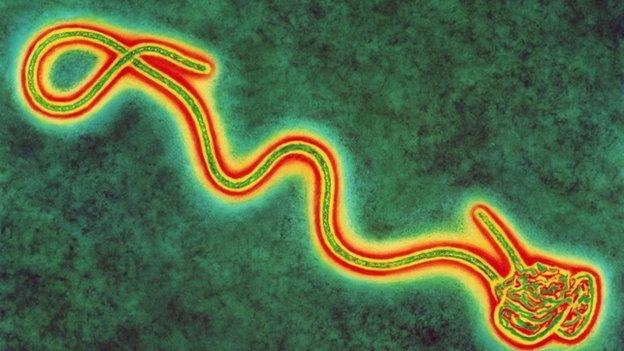Eyewitness: Ebola outbreak fears
- Published
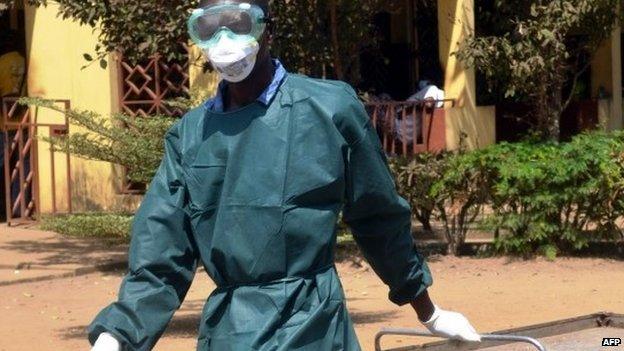
An Ebola outbreak which is so far suspected of killing at least 83 people in Guinea has spread to Liberia, sparking concerns it could spread further afield in West Africa.
But the World Health Organization says all the cases can be traced to the south-east of Guinea, where the outbreak began, and it should not be considered an epidemic.
BBC correspondents in the region explain the effects of the outbreak of the virus, which kills between 25% and 90% of its victims.

Guinea: Alhassan Sillah in Conakry
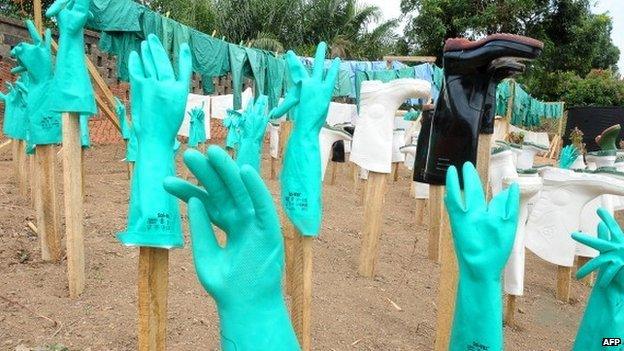
Medical staff wear rubber gloves that must be regularly disinfected
The traditional handshake is no longer a part of salutations in Guinea as people are now really terrified of being infected with Ebola.
An infected person, who may not show symptoms for up to 21 days, can pass on the disease through direct contact.
"I no longer go out of the house just so that I do not have cause to shake people's hands," Mohamed Barry, a 65-year-old retired civil servant, said.
The outbreak originated in the southern Forest Region where Geuckedou is thought to be the hardest hit town with more than half of the cases of infection and deaths.
Bats, a local delicacy in the south, are thought be carriers of the virus. Their sale and consumption has been banned by the health ministry along with other bushmeat.
Many health workers - including at least three doctors - were amongst the first victims.
"Most doctors at first treated the infected patients for malaria - hence medical staff treating these patients also got infected," Dr Sakoba Keita, from the health ministry, said.
The capital, Conakry, is the latest place to be hit, with one reported death - but it is here that the situation is most worrying as two million people live in in the city.
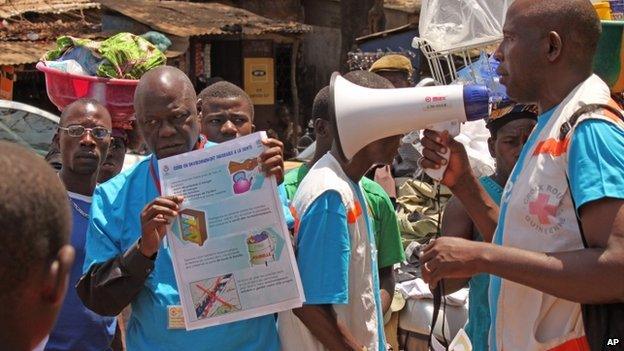
Health workers have been out and about in the capital warning people to take precautions
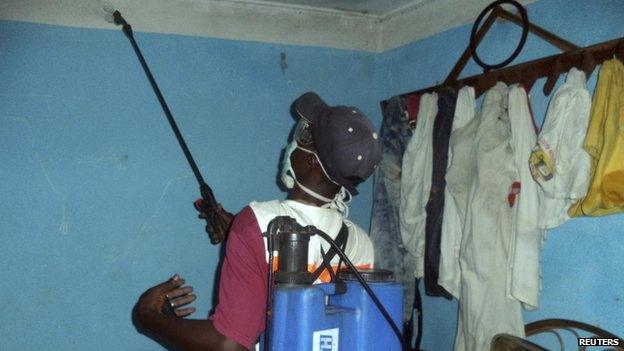
Here the house of a person suspected of having Ebola is sprayed with disinfectant
The disease has no known cure and no vaccine, so the main advice to people from health officials is to keep one's environment clean and wash hands regularly.
All homes now have bowls or buckets filled with disinfectant at their entrance for both inhabitants and visitors to wash their hands.
Trade frozen
The outbreak is also affecting business. Senegal, for example, has closed its land borders with Guinea until further notice, and hundreds of people and their merchandise are stranded in vehicles on the Guinean side.
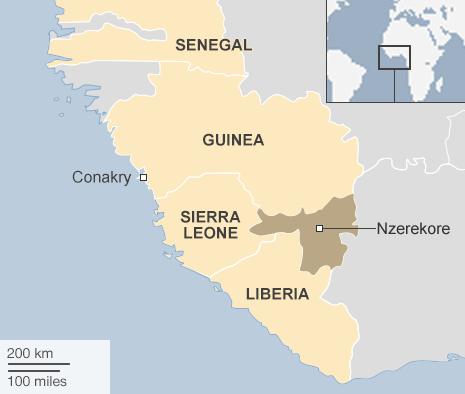
"Our goods are about to perish," one businessman told a local radio station on Tuesday.
The border is one of Guinea's busiest when it comes to cross-border trade - it shares borders with six countries in total.
Some flights have been affected as well: Air Mauritania has refused to fly Guinean passengers in transit in Dakar to Conakry on the grounds of the Ebola outbreak.
The large number of international medical experts from across the world who are now on the ground are giving people some assurance that the disease will be contained.
But funeral corteges are also getting smaller and smaller as a result of a fear of infection by someone who has had contact with a corpse.
"I don't go to any funeral now whether it is an Ebola-related death or not or whether it is my relation that has died or not," says schoolteacher Mariam Mansare.

Liberia: Jonathan Paye-Layleh in Monrovia
When fears about Ebola first started last week, people dismissed it as a way for health officials to solicit funds in the name of a threat. It was not taken at all seriously.
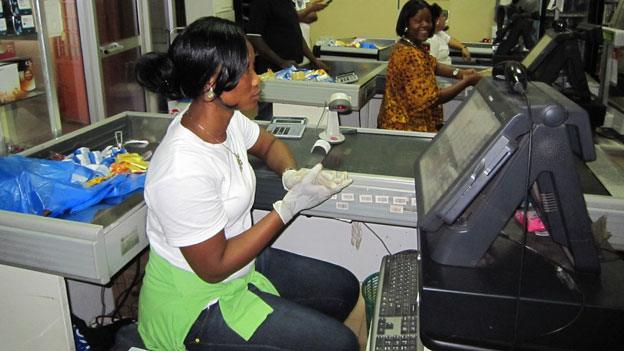
Supermarket employees are now wearing gloves in Liberia
However with the disclosure that four people have died in Liberia, it is now a subject of public discussion in teashops and marketplaces, as well as in the media.
The health ministry has issued guidelines, which include washing hands with soap as often as possible in a day and avoiding fast food bought on the streets.
Some shopping centres in the capital, Monrovia, have made it compulsory for the supermarket employees to wear gloves.
Schools initially closed, but have been ordered to reopen so as not to cause panic.

A region is declared Ebola free after two clear cycles of the 21-day incubation period have passed
Liberia's Health Minister Walter Gwenigale raised a laugh on Monday at a press conference when he warned people to stop having sex because the virus was spread via bodily fluids.
"I see some people smiling but we have to tell you all the facts so that you don't get contaminated," he said.
But news of the Ebola outbreak has not yet affected night life in the capital, as the city's clubs remain open till dawn.

Senegal and other neighbours: Thomas Fessy in Dakar
Ebola is obviously part of people's conversations but there has not been a change in people's behaviour, perhaps as there have been no report of cases here.
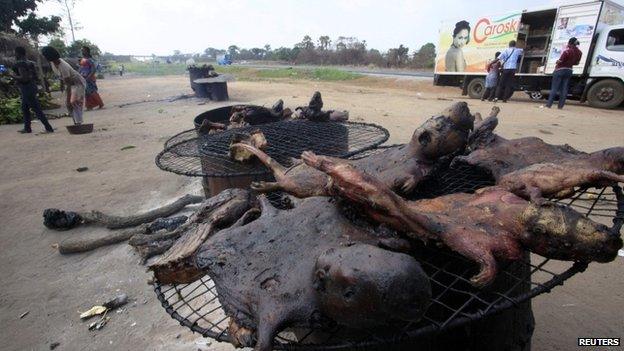
Bushmeat is widely eaten in West Africa
Of course, the government has communicated over the issue and over the weekend it displayed special medical suits that health workers would have to use to handle any suspected case.
Weekly markets near Guinea's border have been suspended to prevent the spread of the disease, and the border has been shut.
In most countries of the region, like in Ivory Coast, the government has advised people not to consume bush meat but it is not been banned and I am told that you can still see it on sale on the side of the road outside the main city Abidjan.
In Sierra Leone, where there are five suspected cases of Ebola, travel restrictions are in place. Travellers have to fill out a questionnaire and indicate if they have suffered from a fever, vomiting or diarrhoea in the last two weeks.
The authorities have also banned relatives from bringing corpses into Sierra Leone from Guinea for burial.
- Published8 October 2014
